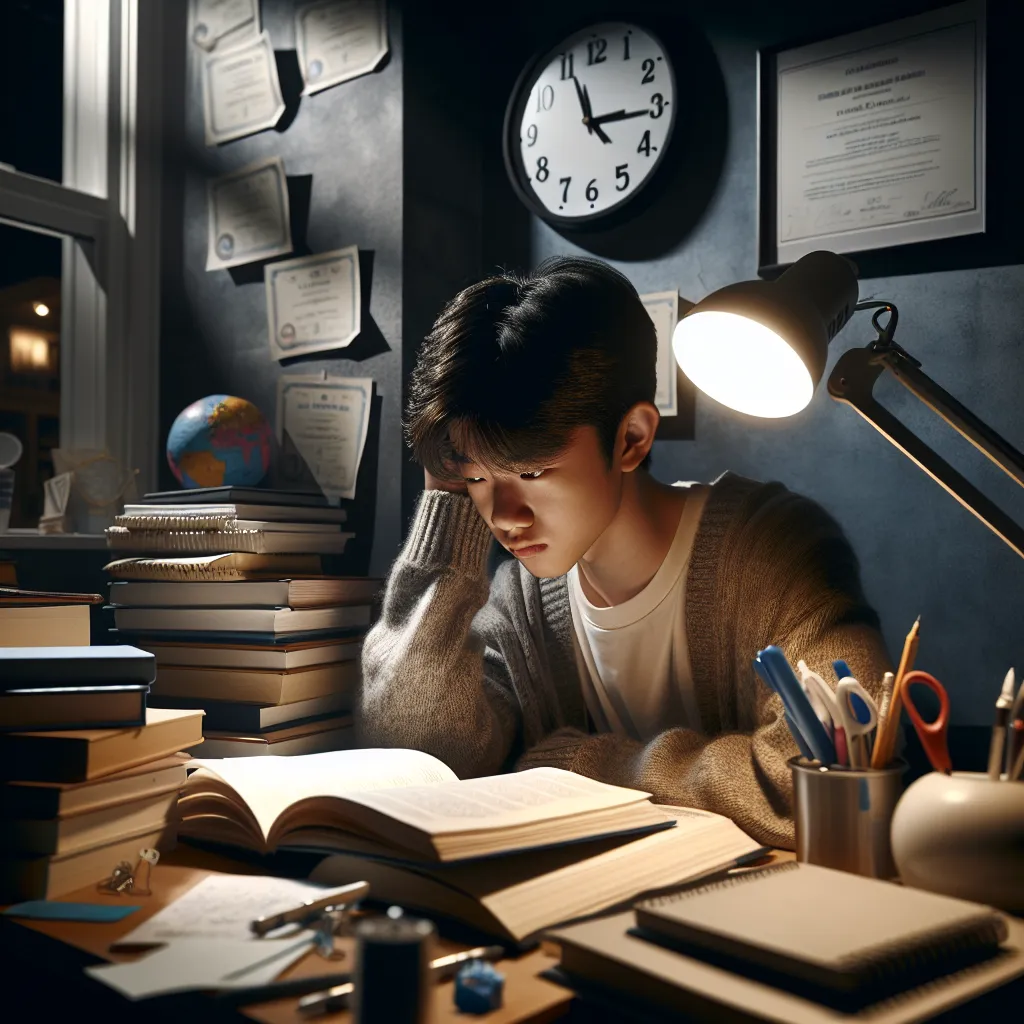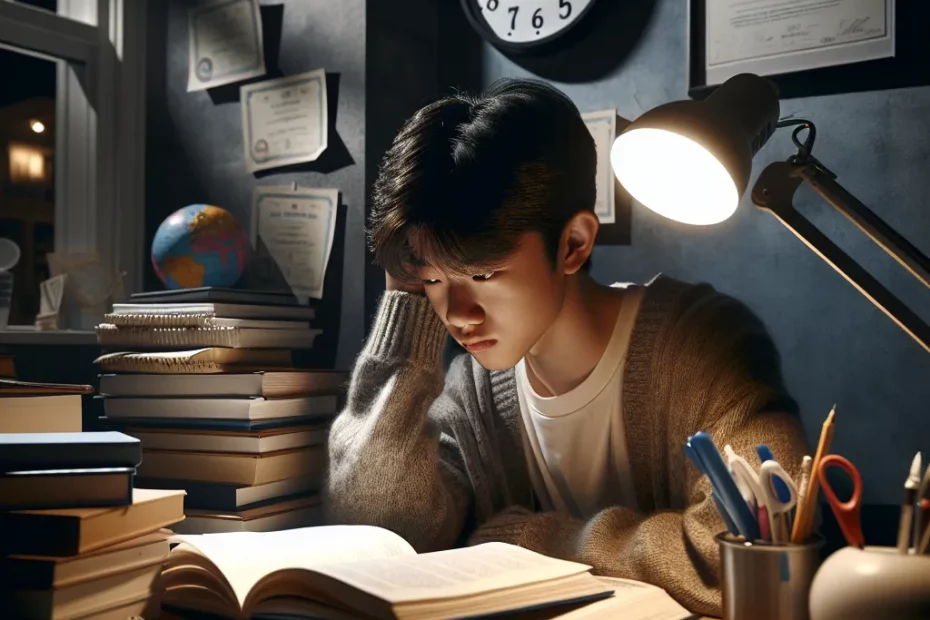In the competitive landscape of Korean education, the pursuit of academic excellence is deeply ingrained in the societal fabric. The pressure to excel academically is a defining feature of the education system, shaping the lives of students and families. This culture of relentless competition has far-reaching implications, impacting not only the academic performance but also the mental well-being of individuals. The high-stakes environment, fueled by societal expectations and parental aspirations, creates a breeding ground for stress and anxiety among students. As a result, the role of parents and society in fostering a supportive and balanced approach to education becomes crucial. Understanding the complexities and challenges of the Korean education system is essential in addressing the pressures faced by students and promoting holistic well-being.

The Culture of Academic Excellence
In the realm of Korean education, the pursuit of academic excellence is deeply ingrained in the cultural fabric. From a young age, students are immersed in a competitive environment where success is equated with high grades and prestigious academic institutions. This culture places immense pressure on students to excel in their studies, often leading to long hours of studying, intense competition, and high expectations from parents and society.
Academic success as a societal reflection
Academic success is not just a personal achievement in Korea; it is a reflection of family honor and societal status. The emphasis on academic excellence is so pervasive that students are often judged not only by their own accomplishments but also by the reputation of the schools they attend.
The rigor of the Korean education system
The Korean education system is known for its rigorous standards and demanding curriculum. Students are required to take a series of standardized tests, such as the College Scholastic Ability Test (CSAT), which plays a crucial role in determining their future academic and career paths. The pressure to perform well on these exams can be overwhelming, with students dedicating countless hours to studying and preparing.
The sacrifices for excellence
Beyond academic performance, extracurricular activities and personal interests often take a back seat in the pursuit of excellence. Many students attend private academies, known as hagwons, after regular school hours to receive additional instruction and support. This intense focus on academics can lead to burnout and mental health issues among students.
The outcomes of academic excellence
Despite the challenges posed by the culture of academic excellence, it has also produced remarkable results. South Korea consistently ranks high in international assessments of student performance, showcasing the effectiveness of its education system in producing high-achieving individuals.
In conclusion, the culture of academic excellence in Korean education is a double-edged sword. While it fosters a competitive spirit and drives students to achieve greatness, it also places immense pressure on them to perform at a high level. Balancing academic success with personal well-being is a challenge that many Korean students face, highlighting the complex nature of education in the country.
Remember, education is not just about grades and test scores; it is also about nurturing well-rounded individuals who can thrive in all aspects of life. The culture of academic excellence should be tempered with a focus on holistic development and the well-being of students.
Impact on Mental Health
In the high-pressure environment of Korean education, the impact on students’ mental health cannot be overlooked. The intense focus on academic achievement, coupled with long hours of studying and fierce competition, takes a toll on the psychological well-being of young individuals. According to a recent study, over 50% of Korean students experience high levels of stress and anxiety related to their academic performance. This alarming statistic highlights the urgent need to address the mental health challenges faced by students in the Korean education system.
Stigma and Mental Health
The prevalence of mental health issues among Korean students is further exacerbated by the stigma surrounding seeking help for psychological problems. Only 30% of students who experience mental health issues actually seek professional support, fearing judgment and discrimination. This reluctance to seek help perpetuates a cycle of suffering in silence, leading to more severe mental health conditions in the long run.
Extreme Measures and Consequences
Moreover, the pressure to excel academically often leads to extreme measures such as sleep deprivation and social isolation. Many students sacrifice their physical and emotional well-being in pursuit of academic success, neglecting crucial aspects of their overall health. The lack of balance in their lives can have detrimental effects on their mental health, leading to issues like depression and burnout.
As a result of these challenges, the suicide rate among Korean students remains alarmingly high. In 2020 alone, there were over 1,000 reported cases of student suicides, shedding light on the devastating consequences of the relentless pressure and competition in the Korean education system. This grim reality underscores the urgent need for systemic changes to prioritize the well-being of students and provide them with the support they need to thrive both academically and mentally.
In conclusion, the impact of the pressures in Korean education on students’ mental health is profound and concerning. It is imperative for educators, policymakers, and parents to work together to create a more supportive and nurturing environment for students, where their mental health is prioritized alongside academic success. By addressing these issues proactively, we can help students develop into resilient and healthy individuals capable of navigating the challenges of the modern world with confidence and strength.
Highly Competitive Environment
In the realm of Korean education, the landscape is defined by its highly competitive environment, where students are constantly under immense pressure to excel academically. The drive for success is ingrained in the culture, with families, schools, and society placing a strong emphasis on academic achievement as a key determinant of future success. 📚💡
The Statistics
The statistics paint a vivid picture of this intense competition. With a staggering 70% of high school graduates pursuing higher education, the race to secure spots in prestigious universities is fierce. The pressure to perform well on standardized tests like the College Scholastic Ability Test (CSAT) is immense, as these scores can make or break a student’s future prospects. 📊📝
Private Tutoring
Furthermore, the prevalence of private tutoring, known as “hagwons,” adds another layer of competitiveness to the mix. Nearly 80% of students receive additional tutoring outside of regular school hours, highlighting the lengths to which individuals are willing to go to gain a competitive edge. The cost of these hagwons can be exorbitant, placing a financial burden on many families. 💸💰
Consequences
The consequences of this hyper-competitive environment are far-reaching. Mental health issues among students, such as anxiety and depression, are on the rise. The constant pressure to perform can take a toll on young minds, leading to burnout and emotional distress. The emphasis on academic success above all else can also stifle creativity and personal growth, limiting the holistic development of individuals. 😔💔
In conclusion, the highly competitive environment in Korean education is a double-edged sword. While it fosters a culture of excellence and hard work, it also comes at a cost to the well-being and overall development of students. Balancing academic rigor with mental health support and a focus on individual growth is essential to ensure a more sustainable and healthy educational system for future generations. 🌟📚
Role of Parents and Society
In the realm of Korean education, the role of parents and society cannot be overstated. Parents in South Korea are deeply invested in their children’s academic success, often starting from a young age. The pressure to excel academically is immense, with parents believing that their children’s future success hinges on their performance in school. This belief is ingrained in the societal fabric, where academic achievement is highly valued and seen as a pathway to a prosperous future.
Parents’ Expectations and Involvement
Parents in South Korea are known for their high expectations of their children, with many enrolling them in various extracurricular activities and private tutoring programs to ensure they stay ahead in their studies. The financial investment in education is substantial, with South Korean parents spending a significant portion of their income on their children’s education.
Societal Influence on Education
Society, on the other hand, plays a crucial role in shaping the educational landscape in South Korea. The emphasis on academic success is not only reflected in the expectations of parents but is also perpetuated by societal norms and values. The pressure to perform well in school is not just an individual burden but a collective one, with students feeling the weight of societal expectations on their shoulders.
Impact on Education System
According to statistics, South Korea has one of the highest rates of private education expenditure in the world, highlighting the significant role that parents and society play in the education system. The competitive nature of the education system in South Korea can be attributed to the collective drive for excellence instilled by parents and reinforced by societal standards.
Fostering Academic Success and Well-being
It is essential to recognize the impact that parents and society have on the educational journey of students in South Korea. While the pursuit of academic excellence is admirable, it is crucial to strike a balance and ensure that students are not overwhelmed by the pressures imposed by external forces. By fostering a supportive and nurturing environment, parents and society can help students thrive academically while also prioritizing their well-being and holistic development.
In conclusion, the role of parents and society in Korean education is undeniable, shaping the academic landscape and influencing the future trajectory of students. It is imperative for parents and society to collaborate in creating a conducive environment that promotes academic success while also prioritizing the overall well-being of students. By working together, parents and society can empower students to excel academically and lead fulfilling lives beyond the confines of academic pressures.
In conclusion, the pressures in Korean education have created a culture of academic excellence that comes at a cost to students’ mental health. The highly competitive environment fueled by societal expectations and parental involvement further exacerbates the situation. It is crucial for all stakeholders, including parents, educators, and policymakers, to work together to prioritize the well-being of students over academic achievements. Balancing academic rigor with mental health support is essential for creating a more sustainable and healthy educational system in Korea.
